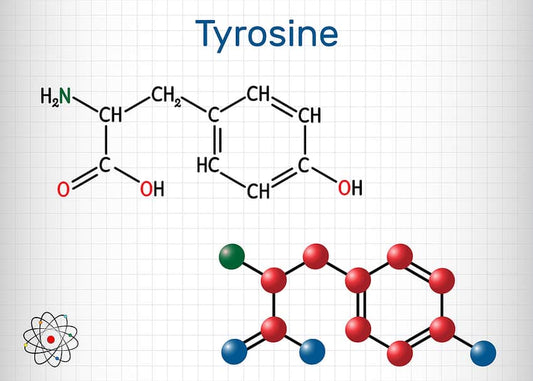The brain is what keeps your mind and body running, and you obviously want it working at top speed. And while several nootropics can help boost cognitive function, there are a few we’re partial to—choline being one.
Your brain makes up only about 2% of your body weight, yet it consumes nearly 20% of your body’s energy when at rest, meaning that you need to nourish it if you want it to perform.
With citicoline, we’re talking about
- Better mental energy
- Stronger focus and attention
- Sharper brain health and cognitive performance
If you’re looking for one of the purest and most effective supplements for keeping the brain’s energy-producing centers firing, we have it. It’s clinically tested for efficacy and supplies the energy your brain needs to stay sharp.
We’re talking everything you want to know about Cognizin Citicoline—what it is, what it does, and why you should take it.
What Is Choline?
For most people who have heard of choline, it’s likely in relation to eggs due to high concentrations in the yolks. But that’s not the only place it’s concentrated.
Choline is an essential nutrient that plays a major role in the structural integrity of all cell membranes, methyl-metabolism, cholinergic neurotransmission, and transmembrane signaling, along with lipid-cholesterol transport and metabolism 1.
It is an amino that’s present in most tissues, usually as a choline-phospholipid (phosphatidylcholine or sphingomyelin), but its metabolites—platelet-activating factor (PAF), acetylcholine, choline plasmalogens, lysophosphatidylcholine, phosphocholine, glycerophosphocholine, and betaine—also comprise a smaller proportion of the total choline pool.
Because of its role in phospholipid formation, choline serves as an essential building block for cell membranes, making it one of the most popular supplements for cognitive support and brain health. But it also plays a key role as a precursor for the biosynthesis of the neurotransmitter acetylcholine 2.
However, despite being an essential nutrient for human health, choline is considered to be dispensable because it can be synthesized de novo through sequential methylation of phosphatidylethanolamine.
Deficiency of this guy is quite rare due to the presence of choline in a wide array of foods, but also the complex interrelationship between choline, methionine, and several B vitamins 2.
What Is Citicoline?
Citicoline, also known as 5′-diphosphocholine (CDP-choline), is an exogenous sodium salt that is naturally found in the body and functions as an essential intermediate in the synthesis of the major phospholipid of the cell membranes, phosphatidylcholine (PtdCho) 3.
In supplementation form, citicoline has been used to treat brain injuries, including traumatic brain injury, stroke, vascular dementia, Parkinson’s disease, and brain aging, where it serves to stabilize cell membranes and reduce the presence of free radicals.
Some research also suggests it may bolster the release of dopamine neurotransmitters in the brain, along with activating the central cholinergic system, increasing plasma adrenocorticotropic hormone (ACTH) levels, and potentiating serum thyrotrophin (TSH) levels 3.
Its ability to stimulate central nicotinic and muscarinic receptors may also trigger the release of growth hormone (GH) and luteinizing hormone (LH).
What Does It Do?
So, while choline is a nutrient required for optimal function of the human body, what does it actually do? Although it has many important functions, we boil it down to three key roles 4:
- A source of methyl groups needed to synthesize the primary methyl donor S-adenosylmethionine
- A part of the neurotransmitter acetylcholine
- A component of the major phospholipids in membranes—phosphatidylcholine (PC) and sphingomyelin
In addition to these three key roles, it’s also required for normal muscle function, lipid transport from the liver, the methylation of homocysteine to form methionine (high levels of homocysteine can be toxic), as well as normal fetal growth and development where it influences stem cell proliferation and apoptosis, thus altering brain and spinal cord structure and function and influencing risk for neural tube defects and lifelong memory function 5.

Photo source: 5
However, of the functions, the most well-known is choline’s involvement in membrane integrity. Phosphatidylcholine, also known as lecithin, is the major phospholipid (>50%) in mammalian cell membranes. The regulatory mechanisms that control phosphatidylcholine biosynthesis are rather complex, but it happens via two pathways 5:
The first pathway involves phosphorylation of choline, which is then converted to cytidine diphosphocholine (CDP-choline); this intermediate, in addition to diacylglycerol, forms phosphatidylcholine and cytidine monophosphate.
The second pathway involves the sequential methylation of phosphatidylethanolamine to form phosphatidylcholine, using S-adenosylmethionine as the methyl donor. This is the most active pathway in the liver, but has also been shown to occur in other tissues like the brain and mammary gland. In addition to that, sphingomyelin, another key membrane phospholipid, is also formed from phosphatidylcholine 6.
The Benefits Of Supplementing With Choline
1. Memory And Cognitive Function
The benefits of choline on cognitive function stem primarily from its role in synthesizing acetylcholine—a powerful neurotransmitter in the brain that’s associated with improved cognitive performance.
A carrier mechanism transports free choline across the blood-brain barrier for biosynthesis at a rate that’s proportional to serum choline concentrations.
Loss of cholinergic neurons in the brain is linked to impaired cognitive function, especially memory loss and Alzheimer's disease (AD) 7.
Adding to that, a rodent study looking at the effects of choline supplementation on age-related loss of memory function found that chronic low dietary intake of choline exacerbated memory loss, whereas choline-enriched diets mitigated memory loss 8.
Studies in humans also show positive results. One study looked at the effects of the precursor for the formation of phosphatidylcholine, cytidine diphosphocholine (CDP-choline), on memory and found that volunteers treated with 1000 mg/day CDP-choline for three months saw an improvement in immediate and delayed logical memory 9.
Another study found similar results with oral administration of CDP-choline (500−1000 mg/day) for four weeks in elderly people with memory deficits, noting that supplementation improved memory in free recall tasks 10.
Research also shows that citicoline may offer neuroprotective effects by enhancing the preservation of an inner mitochondrial membrane component known as cardiolipin, a major regulator for preserving mitochondrial function.
But it also appears to facilitate the preservation of sphingomyelin, which promotes signal transduction in nerve cells, along with exhibiting direct antioxidant effects through stimulating glutathione synthesis and the activity of the enzyme glutathione reductase 11.
2. Mood
Choline is required to produce the neurotransmitter acetylcholine, which plays a key role in regulating memory, mood, and intelligence.
While disruption of cholinergic transmission is known to play a role in cognitive impairment, its role in emotional regulation is much less researched. However, studies suggest that the cholinergic system, in which choline and acetylcholine operate, is an important player in the neurochemistry of several mood disorders 12.
Research has found that depressive symptoms can be induced by blocking acetylcholinesterase (AChE), while antidepressant-like effects can be produced by limiting the activity of acetylcholine (ACh) receptors 13. As such, acetylcholine signaling appears to play a role in the etiology of mood regulation.
Studies have demonstrated that ACh signaling in the hippocampus promotes behaviors related to anxiety and depression, and abnormalities or dysfunction of the cholinergic system may be involved in the development of mood disorders.
Other research shows that citicoline administration in rodents increases striatal dopamine synthesis 11; it has the ability to enhance dopaminergic synthetic pathways, most likely by increasing endogenous striatal acetylcholine levels.
This results from the activation of tyrosine hydroxylase and inhibition of dopamine reuptake, which is related to citicoline’s activity on phospholipid synthetic pathways. Citicoline is also known to have effects on serotonin and norepinephrine, both of which play key roles in mood regulation.
3. Heart Health
While choline and citicoline may not offer significant heart-protective effects like some other compounds, it serves as a precursor to betaine, which is a compound that participates in a reaction that converts homocysteine to methionine; this has led to research on its role as a potential homocysteine-lowering agent.
Homocysteine is an amino acid naturally produced during the breakdown of proteins that should be degraded into less toxic byproducts.
However, hyperhomocysteinemia is a condition where homocysteine levels remain high, and has been shown to be associated with an increased risk of vascular diseases, due to its effects on both the vascular wall structure and the blood coagulation system 14.
Some research does note which choline is a precursor nutrient for the production of betaine, vitamin B6, vitamin B12, and betaine, but not cholines, are listed among the nutrients that may help counteract high homocysteine 15.
Best Of The Best: Cognizin® Citicoline
If you want the sharpest brainpower out there, you need to be taking only the best. And where brain health and cognition are concerned, there’s only one form of choline we look for—Cognizin®.

Performance Lab® Mind Cognizin® is citicoline enhanced with next-generation nutrition technology clinically shown to enhance brain energy, focus, attention, memory, and brain health. It’s been shown to boost brain cell membrane formation by 26% and brain energy by 13.6%.
Mind® combines four of nature's most powerful nootropics for the biggest brain boost. It’s the only nootropic supplement available on the market that enhances cognition and helps your brain recover from intense mental exertion.
Performance Lab® Mind improves performance-driven cognitive functions: Focus, speed, energy, memory, motivation, and more. It’s also the first nootropic to help you bounce back faster by fighting stress burnout, all while supporting brain health.
Mind features Cognizin® (boosts brain energy 13.6%) and eco-friendly Sharp-PS® Green, plus the highest-potency Maritime Pine Bark Extract (95% proanthocyanidins) on the market.
If you want to think like the best, you have to supplement like the best—and that’s Performance Lab Mind®.
References
- SH Zeisel, JK Blusztajn. Choline and human nutrition. Annu Rev Nutr. 1994;14:269-296.
- SH Zeisel, KA Da Costa, PD Franklin, et al. Choline, an essential nutrient for humans.FASEB J. 1991;5(7):2093-2098.
- M Fioravanti, AE Buckley. Citicoline (Cognizin) in the treatment of cognitive impairment.Clin Interv Aging. 2006;1(3):247-251.
- SH Zeisel, KC Klatt, MA Caudill. Choline. Advances in Nutrition. 2018;9(1):58–60.
- SH Choline: critical role during fetal development and dietary requirements in adults.Annu Rev Nutr. 2006;26:229-250.
- K Hanada, M Horii, Y Akamatsu. Functional reconstitution of sphingomyelin synthase in Chinese hamster ovary cell membranes.Biochim Biophys Acta. 1991;1086(2):151-156.
- C Poly, JM Massaro, S Seshadri, et al. The relation of dietary choline to cognitive performance and white-matter hyperintensity in the Framingham Offspring Cohort. Am J Clin Nutr. 2011;94(6):1584-1591.
- RT Bartus, RL Dean, JA Goas, AS Age-related changes in passive avoidance retention: modulation with dietary choline. Science. 1980;209(4453):301-303.
- PA Spiers, D Myers, GS Hochanadel, HR Lieberman, RJ Wurtman. Citicoline improves verbal memory in aging (published correction appears in Arch Neurol 1996 Oct;53(10):964).Arch Neurol. 1996;53(5):441-448.
- XA Alvarez, M Laredo, D Corzo, et al. Citicoline improves memory performance in elderly subjects.Methods Find Exp Clin PhaDulawa SC, Janowsky DS. Cholinergic regulation of mood: from basic and clinical studies to emerging therapeutics. Mol Psychiatry. 2019;24(5):694-709. doi:10.1038/s41380-018-0219-xrmacol. 1997;19(3):201-210.
- I Qureshi, JR Endres. Citicoline: a novel therapeutic agent with neuroprotective, neuromodulatory, and neuroregenerative properties. Natural Medicine Journal. 2010;2(6).
- SC Dulawa, DS Janowsky. Cholinergic regulation of mood: from basic and clinical studies to emerging therapeutics. Mol Psychiatry. 2019;24(5):694-709.
- YS Mineur, A Obayemi, MB Wigestrand, et al. Cholinergic signaling in the hippocampus regulates social stress resilience and anxiety- and depression-like behavior.Proc Natl Acad Sci U S A. 2013;110(9):3573-3578.
- J Selhub . Homocysteine metabolism.Annu Rev Nutr. 1999;19:217-246.
- C Tinelli, A Di Pino, E Ficulle, S Marcelli, M Hyperhomocysteinemia as a Risk Factor and Potential Nutraceutical Target for Certain Pathologies.Front Nutr. 2019;6:49.














